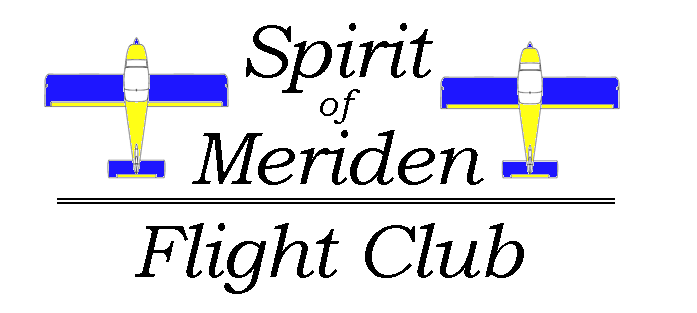SPIRIT OF MERIDEN FLIGHT CLUB
The Spirit of Meriden Flight Club, Inc (SOMFC) is an equity membership non-for-profit organization formed for the enjoyment and educational benefit of flying and owning an airplane. The club was officially formed in September 2020.
The SOMFC owns a single Vans RV-12 registered as an E-LSA. The club is limited to ten members. Each member is a 1/10th owner of the club assets. Members buy a 1/10th share representing aircraft and monetary assets of the club. When a member leaves they are responsible for selling their share. The first 10 members are covering startup costs. The club is run by the members assuming the offices of President, Vice President, Treasurer, and Maintenance officer. The aircraft is kept in a hangar at Meriden Markham Airport (MMK). Club meetings are held once a month. Members are encouraged to attend to keep up on club activities and share flying experiences. Maintenance per FAA rules on E-LSA aircraft are performed by the members. This primarily includes oil and brake changes as well as simple service bulletin compliance. Only the Maintenance office can authorize maintenance of any kind. Annual inspections are performed by an A&P mechanic with club member assistance.
Reservations are performed on line through the FlightCircle.com application. The aircraft is dispatch and check in through Flight Circle before and after a flight respectively. Flight time is recorded and a bill is created. Each member receives and invoice at the end of the month for fixed and hourly expenses.
Members are required to have a checkout by an instructor approved by a club approved instructor. The club allows primary Private Pilot or Light Sport training but is limiting the number of primary students to two for scheduling purposes.
AIRPLANE
The club flies a single RV-12 with a Rotax 912 ULS engine. Performance specifications from Vans aircraft are below. We have found the performance to be as stated or better. It is a responsive aircraft that is fun to fly with terrific visibility. Useful load is adequate for two large adults, full fuel, and a modest amount of baggage. It is set up for day/night VFR with a Dynon Skyview EFIS, a single COM radio, and transponder with ADS-B in and out.
The airplane was built by EAA Chapter 27 members as an educational program with High School students from the neighboring areas. Students met with chapter members twice a week for about three years to construct the aircraft. First flight was May 14, 2020. The club plans to paint the aircraft in the future.
- Pilots Operating Handbook (POH)
- Flight Training Supplement (FTS)
- Maintenance Manual
- Checklist
- Dynon Skyview Manual
- Club Bylaws
Performance Details
| Top Speed | 120 kts |
| Cruise [5500 rpm @ 7500 ft] | 118 kts |
| Cruise [5000 rpm @ 7500 ft] | 104 kts |
| Vs0 | 41 KIAS |
| Vs | 45 KIAS |
| Takeoff Distance | 700 ft |
| Landing Distance | 525 ft |
| Rate of Climb | 900 fpm |
| Ceiling (absolute) | 14,600 ft |
| Ceiling (service ceiling) | 13,000 |
| Range [5500 rpm @ 7500 ft] | 555 sm |
| Range [5000 rpm @ 7500 ft] | 614 sm |
Specifications
| Span | 26 ft 9 in |
| Length | 19 ft 11 in |
| Height | 8 ft 4 in |
| Wing Area | 127 sq ft |
| Empty Weight | 765 lbs (w/options) |
| Gross Weight | 1320 lbs |
| Wing Loading | 10.4 lb/sq ft |
| Power Loading | 13.2 lb/hp |
| Engine | 100 HP Rotax 912 ULS |
| Propeller | Sensenich composite ground-adjustable |
| Fuel Capacity | 20 US gal |
| Cabin Width | 43 in |
| Baggage | 75 lbs |
RATES (Dec, 2022)
Members hold an equity position in the airplane. As an owner a member can sell their share at fair market value. The Initial equity share price was $6500 plus $412 in sales tax, $800 for the paint job, and $158 for startup expenses.
Monthly: $91
Hourly $18 (Dry, no fuel)
As of December, 2022 we have our full complement of 10 members. We are taking names on a waiting list. Members split fixed expenses. Monthly expenses cover insurance, hangar, inspection, aircraft calendar based retirement items, reservation system, and other hourly independent expenses. The hourly rate covers consumables such as brakes, oil, spark plugs, fuel additive, and cleaners. The rate is based on actual flight time (Hobbs) since the Rotax engine maintenance actions are based on such. Members are required to fill the airplane after flying and pay for their own fuel. Typical cruise fuel burn is approximately 5 GPH. Next year's insurance is collected as part of the monthly dues.
CONTACT
For more information, fill out the form below:
